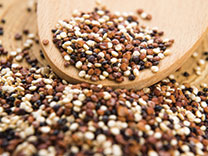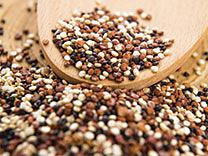3 protein-rich Plant Alternatives
(NC) We all know it's important to get enough protein in our diets. This essential nutrient plays a significant role in many of our body's functions, including the building and repairing of tissues, acting as a source of energy, and strengthening our immune system through the formation of antibodies.
Commonly touted sources of protein include eggs, fish, and various types of meat, but did you know there are many plant alternatives available? Here are three plant sources, recommended by the Canadian Health Food Association that can help make your meals even healthier.
1. Buckwheat. Contrary to the second half of its name, you may be surprised to learn that buckwheat is not actually wheat. Instead, similar to quinoa, it's a fruit seed that also makes for a gluten-free grain substitute. Naturally high in protein, buckwheat is an excellent source of soluble fibre — the type of fibre that helps lower cholesterol, maintain healthy blood sugar levels, and relieve common digestive problems like diarrhea.
2. Lentils. There's a reason why lentils are becoming increasingly well known for their rich nutritional content. In 2013, the United Nations declared that 2016 would be known as the international year of pulses to promote the health benefits of this type of food. These gluten-free legumes are high in protein and are a great source of other nutrients including insoluble fibre, iron, and potassium. Lentils are also high in folate, a water-soluble B vitamin that may be deficient in those with celiac disease.
3. Quinoa. If you're looking for a high protein substitute that also makes for an effective rice alternative, look no further than quinoa. This ingredient is just as versatile as it is nutritious. Quinoa boasts many health benefits — it's a complete protein, which means it contains all nine essential amino acids as well as other essential minerals like magnesium, manganese, and phosphorus. Quinoa is also gluten-free, high in fibre, and contains antioxidants.
If you're having difficulty getting your daily amount of protein, you can also try plant-based protein powders that you can mix into a healthy breakfast smoothie.
Find these options at your local natural health store using chfa.ca. Remember to consult your healthcare practitioner before making changes to your lifestyle regimen.
Comments
There are 0 comments on this post













